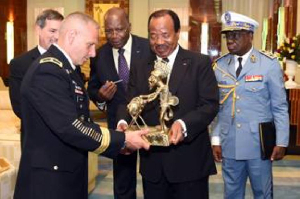How the Western media reports on Africa has always been an issue for most Africans. Many argue that the positives are hardly mentioned; the negatives are magnified; issues aren’t covered comprehensively; the sensational is focused on to reinforce longstanding stereotypes, and the list goes on.
In part to counter this and allow Africans to tell their own story, the African Union established the Pan African News Agency (PANA) in 1979 in Addis Ababa.
In recent years, there have been commendable attempts by major news agencies to report on Africa objectively, providing the necessary context to allow for appreciation of unique African stories. Progress has been made.
Then the Ebola “epidemic in West Africa” occurred. And all that was wrong with African reporting is back to the fore and being displayed in the manner in which reporters are telling the Ebola story. And quite unsurprisingly, the chorus is unanimous and all too familiar — Africa is in the midst of a pandemic.
The headlines don’t educate; they elicit fear and panic of the Dark Continent from which this deadly disease emanates. This fuels the kind of reaction that had parents from a high school in Ohio insisting a student be withdrawn because he is from Africa (nowhere near “West Africa”) and could infect their children with Ebola! Or to Connecticut, where a student was barred from going back to school after returning from a trip to Nigeria, despite WHO declaring Nigeria Ebola-free on Octber 20.
Other health agencies compound the issue. The USA’s Centre for Disease Control’s Ebola page reads: “West Africa Ebola Outbreak”, though in smaller print, it does talk about the affected three countries of Guinea, Liberia and Sierra Leone.
The U.S. Food and Drug Administration’s page talks about “2014 Ebola Outbreak in West Africa”, with little effort to specify the affected countries. And the Wikipedia page dedicated to this has a headline that reads: Ebola Virus Epidemic in West Africa.
Maybe we should begin with a definition of West Africa. With the current membership of the Economic Community of West African States (ECOWAS), West Africa has been defined as including the 15 countries of Benin, Burkina Faso, Cape Verde, Gambia, Ghana, Guinea, Guinea-Bissau, Cote d’Ivoire, Liberia, Mali, Niger, Nigeria, Senegal, Sierra Leone and Togo. And as of today, only three of these 15 have active cases.
All this may be explained by the way the continent has traditionally been viewed. Clearly, the Western media’s portrayal of the continent as one of gloom and doom; poverty and penury; war and chaos; disaster and disease may have stemmed from positions of dearth of reasonable appreciation of the African situation.
Many of the stories told about the continent have been unremittingly grim and have come from the perspectives of speakers who most certainly have read or heard only one side of the story; much like what Chimamanda Adichie describes as “The Danger of a Single Story”.
The Severe Acute Respiratory Syndrome (SARS) had a different shade of coverage, probably because it was traced to a businessman who travelled from the Guandong Province of China, through Hong Kong, to Hanoi, Vietnam. If only his route was linked to Africa in any way! Some Western media houses are now taking a second look at how they are reporting on Ebola.
For example, the BBC recently ran a story highlighting some shortfalls, while CNN has a section on its website titled “What an Ebola Survivor Looks Like,” focusing on Ebola survivors from affected countries. But the harm has already been done. The stereotypes have been perpetuated and reinforced.
We do, however, have to admit that the shackle of guilt cannot be wound around the neck of the Western media alone. Truth is, in many cases, African media houses carried their reports on the Ebola outbreak from international wires, perpetuating the very image we reject. And since many Western media houses that report on Africa actually have African representatives who are indigenes, are we our own enemies?
If African news outlets depend on Western-based international wires to tell Africa’s story and we continue to pick our cue on what audiences need to hear from Western media outlets, we may be in no position to reverse this trend.
One way to make a difference is to focus on how we prepare our journalists. Institutions such as the African University College of Communications and the Ghana Institute of Journalism should, therefore be commended and supported.
But more needs to, and should be done. If we are finally going to tell Africa’s story, we must begin with an investment in the people who will lead this charge and our beloved continent into a very complex future.
Opinions of Thursday, 20 November 2014
Auteur: Dr. G. Koryee Anim-Wright














